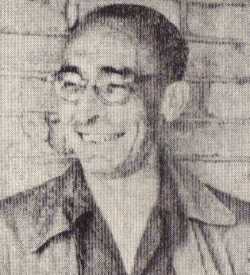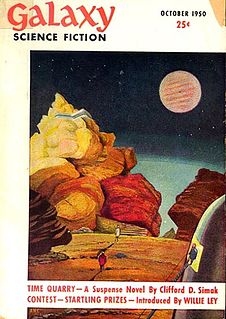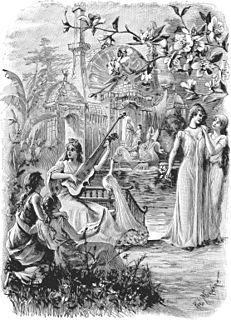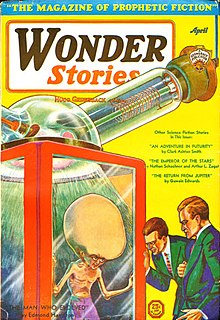Plot summary
The narrator, Arthur Wright, and his friend Hugh Dutton visit their former classmate, Dr. John Pollard at his combination house/laboratory. Pollard, a classic mad scientist, has been conducting research into the question of what causes the mutations that drive evolution. Pollard informs them that he has determined that cosmic rays are the source of the mutations, and that he has decided that bombarding himself with heavy concentrations of cosmic rays will cause him to evolve into a future version of humanity.
Pollard has built himself a cosmic-ray-concentrator that will allow him to evolve at the rate of 50 million years every 15 minutes exposure, but he needs someone else to operate it, which is why he has invited Wright and Dutton to his laboratory. Wright reluctantly agrees to operate Pollard's device.
Fifteen minutes in the device leave Pollard with enhanced intelligence and a highly developed physique. However, he is eager to continue the process and explore the further evolutionary changes mankind will undergo. The next stage, though, finds him with a huge bald head atop a frail body and atrophied emotions. He insists on continuing, and each stage of the process finds his brain larger and more powerful, and his body smaller and weaker. At each stage Pollard derides the previous stage as brutish and primitive, praises his current condition and looks forward to the next stage in his evolution.
After the third transformation, Pollard's ambition is to enslave humanity and turn the Earth into a vast laboratory for his own use, but as the transformations proceed he moves beyond such desires, with only intellectual curiosity remaining. The penultimate stage finds Pollard transformed into a vast, naked, telepathic brain that feeds on pure energy. A final use of the device, to Wright's shock, leaves Pollard a pool of protoplasm, apparently bringing the evolution of humanity full circle back to its beginning. Dutton goes mad with horror and wrecks the laboratory, and Wright barely pulls him out before it, and Pollard's house, go up in flames.
Dutton remains permanently mad, while Wright is left to wonder whether Pollard really has simply returned to humanity's starting point. "Or is this evolutionary cycle we saw a cycle in appearance only, is there some change that we cannot understand, above and beyond it? I do not know which of these possibilities is truth, but I do know that the first of them haunts me."
Cultural references
An episode of the Mighty Max television series, "Zygote Music", has a similar storyline, in which a scientist uses a machine to evolve. In the final stage, however, the scientist has been transformed into pure thought. He is defeated in a manner similar to the one used to prevent Pollard from taking over the Earth, namely, advancing his evolution until he is beyond such desires.
The Outer Limits episode "The Sixth Finger" features a character that is artificially evolved; according to David Schow's book The Outer Limits Companion, the original conclusion of the script precisely imitated "The Man Who Evolved," but was changed in later script revisions to simply restore the superhuman to his original human state.
Marvel comics character Modok and DC comics Hector Hammond are similar human beings, who evolve into future beings. Other characters, in various Superman and Fantastic Four comics in the 1980s, used similar themes.

Leigh Douglass Brackett was an American science fiction writer called "the Queen of Space Opera." She was also a screenwriter known for The Big Sleep (1946), Rio Bravo (1959), and The Long Goodbye (1973). She also worked on an early draft of The Empire Strikes Back (1980), elements of which remained in the film; she died before the film went into production. She was the first woman shortlisted for the Hugo Award. In 2020, she won a Retro Hugo for her novel The Nemesis From Terra, originally published as "Shadow Over Mars".

Edmond Moore Hamilton was an American writer of science fiction during the mid-twentieth century.
Entertaining Comics, more commonly known as EC Comics, was an American publisher of comic books, which specialized in horror fiction, crime fiction, satire, military fiction, dark fantasy, and science fiction from the 1940s through the mid-1950s, notably the Tales from the Crypt series. Initially, EC was owned by Maxwell Gaines and specialized in educational and child-oriented stories. After Max Gaines' death in a boating accident in 1947, his son William Gaines took over the company and began to print more mature stories, delving into genres of horror, war, fantasy, science-fiction, adventure, and others. Noted for their high quality and shock endings, these stories were also unique in their socially conscious, progressive themes that anticipated the Civil Rights Movement and dawn of 1960s counterculture. In 1954–55, censorship pressures prompted it to concentrate on the humor magazine Mad, leading to the company's greatest and most enduring success. Consequently, by 1956, the company ceased publishing all of its comic lines except Mad.

High Evolutionary is a fictional character appearing in American comic books published by Marvel Comics.
Captain Future is a pulp science fiction hero — a space-traveling scientist and adventurer —originally published in his namesake pulp magazine from 1940 to 1944. The character was created by editors Mort Weisinger and Leo Margulies. The majority of the stories were authored by Edmond Hamilton. A number of adaptations and derivative works. Significant was a 1978-79 Japanese anime (キャプテン・フューチャー), which was dubbed into several languages and proved popular, particularly in Spanish, French, German, Italian and Arabic. His francophone name is Capitaine Flam.

Genetics and the Origin of Species is a 1937 book by the Ukrainian-American evolutionary biologist Theodosius Dobzhansky. It is regarded as one of the most important works of the modern synthesis, and was one of the earliest. The book popularized the work of population genetics to other biologists, and influenced their appreciation for the genetic basis of evolution. In his book, Dobzhansky applied the theoretical work of Sewall Wright (1889–1988) to the study of natural populations, allowing him to address evolutionary problems in a novel way during his time. Dobzhansky implements theories of mutation, natural selection, and speciation throughout his book to explain habits of populations and the resulting effects on their genetic behavior. The book explains evolution in depth as a process over time that accounts for the diversity of all life on Earth. The study of evolution was present, but greatly neglected at the time. Dobzhansky illustrates that evolution regarding the origin and nature of species during this time in history was deemed mysterious, but had expanding potential for progress to be made in its field.
Multivac is the name of a fictional supercomputer appearing in over a dozen science fiction stories by American writer Isaac Asimov. Asimov's depiction of Multivac, a mainframe computer accessible by terminal, originally by specialists using machine code and later by any user, and used for directing the global economy and humanity's development, has been seen as the defining conceptualization of the genre of computers for the period (1950s-1960s), and Multivac has been described as the direct ancestor of HAL 9000.

Planet Stories was an American pulp science fiction magazine, published by Fiction House between 1939 and 1955. It featured interplanetary adventures, both in space and on some other planets, and was initially focused on a young readership. Malcolm Reiss was editor or editor-in-chief for all of its 71 issues. Planet Stories was launched at the same time as Planet Comics, the success of which probably helped to fund the early issues of Planet Stories. Planet Stories did not pay well enough to regularly attract the leading science fiction writers of the day, but occasionally obtained work from well-known authors, including Isaac Asimov and Clifford D. Simak. In 1952 Planet Stories published Philip K. Dick's first sale, and printed four more of his stories over the next three years.

Lovecraftian horror, sometimes used interchangeably with "cosmic horror" is a subgenre of horror fiction and weird fiction that emphasizes the horror of the unknowable and incomprehensible more than gore or other elements of shock. It is named after American author H. P. Lovecraft (1890–1937). His work emphasizes themes of cosmic dread, forbidden and dangerous knowledge, madness, non-human influences on humanity, religion and superstition, fate and inevitability, and the risks associated with scientific discoveries, which are now associated with Lovecraftian horror as a subgenre. The cosmic themes of Lovecraftian horror can also be found in other media, notably horror film, horror games and comics.

The Strange World of Planet X is an independently made 1958 British science fiction horror film, produced by George Maynard and John Bash, directed by Gilbert Gunn, that stars Forrest Tucker and Gaby André. The film was distributed in the UK in February, 1958 by Eros Films. It was released in the US on July 7, 1958 by Distributors Corporation of America as a double feature with The Crawling Eye, also starring Tucker.
Cosmicism is the literary philosophy developed and used by the American writer H. P. Lovecraft in his weird fiction. Lovecraft was a writer of philosophically intense horror stories that involve occult phenomena like astral possession and alien miscegenation, and the themes of his fiction over time contributed to the development of this philosophy.

Before the Golden Age: A Science Fiction Anthology of the 1930s is an anthology of 25 science fiction stories from 1930s pulp magazines, edited by American science fiction writer Isaac Asimov. It also includes "Big Game", a short story written by Asimov in 1941 and never sold. The anthology was first published in April 1974, and won the 1975 Locus Award for Best reprint anthology.

Rick Starr, Space Ranger is a science fiction hero who was published by DC Comics in several of their 1950s and 1960s anthology titles. He first appeared in Showcase #15 and was created by writers Edmond Hamilton and Gardner Fox and artist Bob Brown. The character has notable similarities to a preceding character named David "Lucky" Starr, created by novelist Isaac Asimov in his 1952 novel David Starr, Space Ranger. After appearing in Showcase #15 and 16, the Space Ranger was given a cover-starring series in Tales of the Unexpected, starting with issue #40 and lasting until #82 (1959–64). Afterwards, he moved to Mystery in Space.
Darwinian literary studies is a branch of literary criticism that studies literature in the context of evolution by means of natural selection, including gene-culture coevolution. It represents an emerging trend of neo-Darwinian thought in intellectual disciplines beyond those traditionally considered as evolutionary biology: evolutionary psychology, evolutionary anthropology, behavioral ecology, evolutionary developmental psychology, cognitive psychology, affective neuroscience, behavioural genetics, evolutionary epistemology, and other such disciplines.

"Darwinian Pool Room" is a science fiction short story by American writer Isaac Asimov. It was first published in the October 1950 issue of Galaxy Science Fiction, edited by Horace L Gold, and reprinted in the 1975 collection Buy Jupiter and Other Stories. The story was inspired by lunch-time discussions between the author and his colleagues at Boston University. In 1989 Asimov noted, "I have always considered it among the least satisfactory stories I have ever written".

Comets is an anthology of science fiction short stories edited by Isaac Asimov, Martin H. Greenberg and Charles G. Waugh as the fourth volume in their Isaac Asimov's Wonderful Worlds of Science Fiction series. It was first published in paperback by Signet/New American Library in February 1986.

Atlantis is an anthology of themed fantasy and science fiction short stories on the subject of Atlantis edited by Isaac Asimov, Martin H. Greenberg and Charles G. Waugh as the ninth volume in their Isaac Asimov's Magical Worlds of Fantasy series. It was first published in paperback by Signet/New American Library in January 1988.

Evolution has been an important theme in fiction, including speculative evolution in science fiction, since the late 19th century, though it began before Charles Darwin's time, and reflects progressionist and Lamarckist views as well as Darwin's. Darwinian evolution is pervasive in literature, whether taken optimistically in terms of how humanity may evolve towards perfection, or pessimistically in terms of the dire consequences of the interaction of human nature and the struggle for survival. Other themes include the replacement of humanity, either by other species or by intelligent machines.

Biology appears in fiction, especially but not only in science fiction, both in the shape of real aspects of the science, used as themes or plot devices, and in the form of fictional elements, whether fictional extensions or applications of biological theory, or through the invention of fictional organisms. Major aspects of biology found in fiction include evolution, disease, genetics, physiology, parasitism and symbiosis (mutualism), ethology, and ecology.

The Best of Edmond Hamilton is a collection of science fiction short stories by American author Edmond Hamilton, edited by his wife and fellow science fiction writer Leigh Brackett. It was first published in hardback by Nelson Doubleday in April 1977 and in paperback by Ballantine Books in August of the same year as a volume in its Classic Library of Science Fiction. The book was reissued in trade paperback and ebook editions by Phoenix Pick in November 2010. It has also been translated into German.














